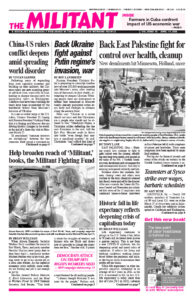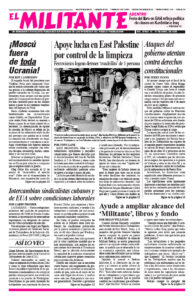Capitalism’s World Disorder: Working-Class Politics at the Millennium by Jack Barnes, national secretary of the Socialist Workers Party, is one of Pathfinder’s Books of the Month for April. Written on the eve of the 21st century, it covers the fast-breaking events that shook world politics from the 1987 near-meltdown of the world’s stock markets to the Mexican “peso crisis” of December 1994. These events lay the groundwork for today’s deepening shifts and crises in the global world order. The excerpt is from “The Vote for Ross Perot and Patrick Buchanan’s ‘Culture War’: What the 1992 Elections Revealed.” Copyright © 1999 by Pathfinder Press. Reprinted by permission.
International capitalism’s stock, bond, and currency markets today are indeed, as widely proclaimed, becoming more and more interconnected and, partly as a result, they are also becoming more unstable. Just a little over five years ago, the world’s stock markets crashed. In just one day in October 1987, the stock market in the United States plunged nearly 25 percent. The crash sent shock waves through the international bourgeoisie, and working people sensed it was the harbinger of a deepening social crisis worldwide. It was the first sharp public signal of an accelerated decline in the post-World War II curve of capitalist development — the first signal that a worldwide depression had become inevitable. …
Bankers put their money where they anticipate it will be safer. But these enormous currency transfers increasingly turn the day-to-day business of banking into speculation, further destabilizing the world capitalist system.
Unimaginable sums of money are traded back and forth every day. With the development of computers and telecommunications, the speed and quantity of international transactions in a single twenty-four hours is mind-boggling. …
As recently as the early 1970s, annual currency trading across borders was still only a fraction of world trade. Today, however, no government or big-business statistical agency really knows the exact scope and size of this currency trading, although most public estimates put it at more than $1 trillion each day.
As profit rates decline, capitalists look for more and more ways of using money to make money. Investing in plants and equipment does not bring them sufficiently competitive returns, so they keep inventing new kinds of paper instruments to trade and speculate with, including accelerated currency speculation. Capitalists have faced a long-run decline in profit rates at least three times before in the history of world capitalism, and each time it has led to a deep crisis before it could be turned around. But the speed of international communication today, the enormity of the monetary amounts involved, and the percentage of the world’s working people brought under capitalist exploitation since the post-World War II decolonization make the potential scope and explosiveness of the coming crisis truly staggering. …
Governments and national banks no longer have much control over their currencies. … World currency markets are awash with dollars. Dollars are held in massive quantities by corporations all over the globe, including by many owned in full or in part by U.S. capital. In fact, some 50 percent of all private financial wealth in the world is held in dollars, as well as more than half of all exchange reserves in the vaults of foreign central banks. In Russia, and even Eastern Europe to some degree, the dollar is the only real store of value today.
The conflicting national capitalist classes ultimately cannot control the results of their intensifying competition — and not because their actions are “irrational.” Deep social crises result from acts that are completely rational for the profit maximization of particular capitalists competing with other capitalists and with other particular national capitals. The consequences of all these separate rational, short-term, and pragmatic decisions, however, further destabilize the world imperialist system.
Capitalist governments try to buffer some of these unanticipated consequences. In a manner of speaking, they resort to a kind of socialism — the socialism of the bourgeoisie, the socialization of their losses.
The financial press wags its finger at General Motors management today, saying it would be filing for bankruptcy protection if it were a small business and that it got that way by making short-run, revenue-maximizing decisions instead of long-run investment decisions. But that is what all owners of capital do, all the more so when their profit rate is declining and their mass of profits is stagnating. When profit rates get low enough, the owners of capital consider it better to cut costs — to “downsize” — than to invest in the expansion of capacity with no foreseeable competitive returns. And it is not enough for capitalist governments to try to keep interest rates low either. Capitalists are not going to borrow to invest unless anticipated profits make that a more lucrative use of their money than some alternative — like currency speculation, for example. …
Instability and sharpening conflicts will continue to mark the imperialist world. There will be more banking and credit crises in the years ahead. And along with them, confidence in the bourgeois leaderships of the imperialist countries will continue declining, too. We should note the tendency today for prime ministers, presidents, and other bourgeois office-holders to be elected with a decreasing percentage of the populace having any confidence that these political figures will be able to turn things around.
This is an important economic fact, not just a political fact. Because workers should not ever fall for the ultimate fetish of money — the notion that there is something objective that determines the worth of a currency. There is nothing objective about it. The paper currency of a national state under capitalism is only as strong as the confidence of the population, of the dominant propertied families themselves, and of international bankers in the stability and future of that ruling class and the competence of its leading figures.


